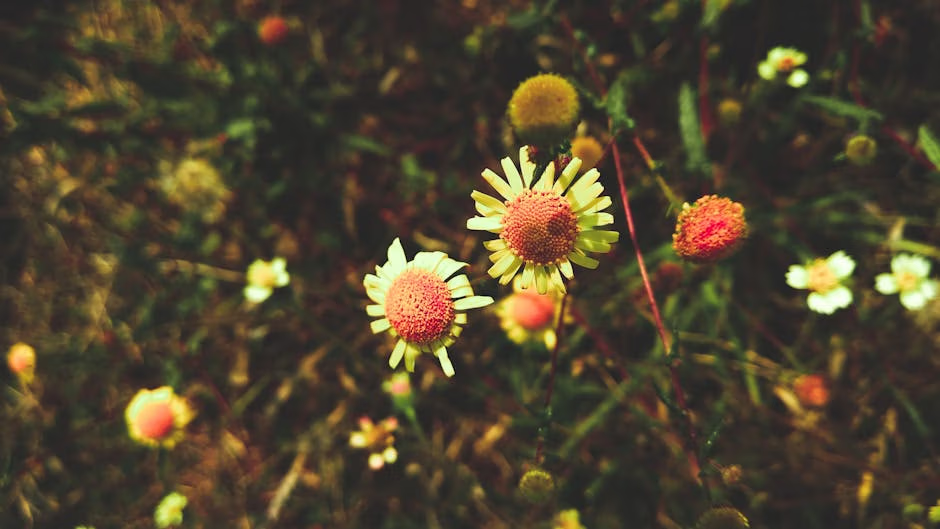Native plants Charleston SC: Top 5 Essential Picks 2024
Native plants Charleston SC are a natural fit for the region’s unique climate, offering a beautiful and sustainable option for landscaping. Key native plants recommended for this area include:
- Oakleaf Hydrangea: Showy, low-maintenance shrubs that thrive in Charleston’s climate.
- Ear-leaved Tickseed: Dazzling flowers that are both hardy and pollinator-friendly.
- Sweetgrass: Tolerant to heat and drought, adding a touch of charm with its fluffy pink plumes.
- Sabal Palmetto: The state tree, known for its resilience against hurricanes and salt.
- Black-Eyed Susan: A drought-tolerant option that supports pollinators.
Charleston’s sultry, humid weather is perfectly suited to these plant species, as they are adapted to withstand the region’s hurricanes, mild winters, and warm summers. Choosing native plants not only reduces the need for artificial fertilizers and pesticides but also contributes positively to the local ecosystem by supporting pollinators and preventing soil erosion.
This guide is crafted by the helpful team at Lowcountry Ace, not just custodians of quality gardening materials but also devoted supporters of sustainable landscapes. Our dedication is in empowering homeowners in Charleston, SC, to accept local greenery with ease and efficiency.
Begin your journey with Charleston’s vibrant native flora by installing these ecological champions in your garden. Watch them flourish beautifully while you enjoy a carefree, environmentally-friendly garden. Stay tuned as we explore the amazing advantages of welcoming these natural wonders into your space.
Native plants Charleston SC vocab explained:
– Charleston grass seed
– Charleston patio furniture
– garden supplies Charleston
Benefits of Native Plants in Charleston
Native plants Charleston SC offer numerous advantages that make them an ideal choice for local gardens. Let’s explore the key benefits:
Hurricane-Resistant
Charleston’s location on the southeastern coast means it’s no stranger to hurricanes. Native plants like the Sabal Palmetto are well-adapted to withstand these storms. Their deep root systems and flexible structures allow them to endure high winds and heavy rains, unlike many non-native species that may get damaged or uprooted.
Low-Maintenance
One of the most appealing aspects of native plants is their low-maintenance nature. Because they’re adapted to Charleston’s humid subtropical climate, they thrive without the need for fertilizers or pesticides. Plants like the Oakleaf Hydrangea and Sweetgrass flourish in the local soil and climate, saving you time and effort.
Pollinator-Friendly
Native plants are a boon for local wildlife, especially pollinators. The bright blooms of the Black-Eyed Susan and the Ear-leaved Tickseed attract bees, butterflies, and birds, supporting biodiversity in your garden. By choosing native plants, you’re contributing to a healthier ecosystem and encouraging the presence of these essential creatures.
Disease-Resistant
The moist climate of Charleston can be a breeding ground for plant diseases. However, native plants are naturally resistant to common issues like powdery mildew and leaf spot. This resilience reduces the need for chemical treatments, making your garden healthier and more sustainable.
By embracing native plants Charleston SC, you are not only creating a beautiful and resilient garden but also supporting the local environment. These plants are perfectly suited to thrive in Charleston’s unique conditions, offering a practical and eco-friendly landscaping solution.
Next, we’ll dive into the top native plants for Charleston gardens and how you can incorporate them into your landscape.
Top Native Plants for Charleston Gardens
When it comes to creating a beautiful garden in Charleston, choosing native plants is a smart choice. They are perfectly adapted to the local climate and offer a range of benefits. Let’s explore some of the top native plants Charleston SC gardeners love.
Sweetgrass
Sweetgrass is a Lowcountry favorite that thrives in Charleston’s heat and drought conditions. This perennial grass stays a vibrant green during spring and summer, then surprises with cotton-candy-pink plumes in the fall. It’s not only beautiful but also low-maintenance, making it a perfect choice for those who want a stunning garden without much fuss.
Sabal Palmetto
The Sabal Palmetto, also known as the Cabbage Palm, is South Carolina’s state tree for a reason. It’s incredibly hurricane-resistant and salt-tolerant, ideal for Charleston’s coastal environment. With its strong trunk and lush, fan-shaped leaves, the Sabal Palmetto adds a tropical feel to any landscape. Plus, it’s a great choice for those looking to create a resilient garden.
Black-Eyed Susan
For a pop of cheerful color, consider planting Black-Eyed Susans. These bright yellow flowers are not just eye-catching but also drought-tolerant and perfect for pollinator gardens. They attract bees and butterflies, helping to support local ecosystems. Black-Eyed Susans are tough and thrive in less-than-ideal soils, making them a reliable choice for any garden.
Southern Magnolia
The Southern Magnolia is a classic choice for Charleston gardens. This evergreen tree is known for its large, fragrant flowers and glossy leaves. It’s not only beautiful but also serves as a food source for wildlife. The Southern Magnolia’s resilience to heat makes it a staple in local landscapes, providing shade and beauty year-round.
Oakleaf Hydrangea
Oakleaf Hydrangeas are a must-have for those who love showy flowers and seasonal color. These shrubs bloom in late spring with clusters of white flowers that gradually turn pink and purple. Their leaves change color in the fall, adding visual interest to your garden. Oakleaf Hydrangeas are low-maintenance and thrive in Charleston’s climate, making them a favorite among gardeners.
By incorporating these native plants Charleston SC into your garden, you can create a stunning and sustainable landscape that thrives in the local environment. These plants not only improve the beauty of your garden but also contribute to a healthier ecosystem.
Next, we’ll explore how to incorporate these native plants into your landscape with practical tips and guidelines.
How to Incorporate Native Plants into Your Landscape
Incorporating native plants Charleston SC into your garden is easier than you might think. With the right preparation and care, you can enjoy a beautiful, low-maintenance landscape that supports local wildlife.
Soil Preparation
Start with the soil. Charleston’s sandy soil is well-drained, which is perfect for many native plants. Southern Magnolia and Sabal Palmetto thrive in acidic, sandy, or loamy soil. Test your soil’s pH and amend it with organic matter if needed. Compost or well-rotted manure can improve soil structure and provide nutrients.
For plants like Sweetgrass, which prefer sandy conditions, minimal soil amendment is needed. Just ensure good drainage and avoid over-compacting the soil.
Planting Tips
Timing is key. Plant your natives in the fall or early spring when temperatures are cooler, and rainfall is more consistent. This helps roots establish before the heat of summer.
Space your plants properly to allow for growth. Oakleaf Hydrangea and Southern Magnolia need room to spread, while Black-Eyed Susan can be grouped for a fuller look. Follow planting guides for each species, considering mature size and growth habits.
Mulch around your plants to retain moisture and suppress weeds. A 2-3 inch layer of organic mulch, like pine straw or shredded bark, helps keep roots cool and soil moist.
Watering Guidelines
Native plants are adapted to Charleston’s climate, so they generally need less water once established. However, young plants require regular watering.
For the first growing season, water deeply once or twice a week, depending on rainfall. Use a soaker hose or drip irrigation to deliver water directly to the roots, reducing evaporation. After the first year, most natives, like Sweetgrass and Black-Eyed Susan, will thrive with natural rainfall.
Avoid overhead watering to prevent leaf diseases. Instead, water in the early morning or late afternoon to minimize evaporation and fungal issues.
By following these steps, you can successfully integrate native plants Charleston SC into your garden, creating a resilient and eco-friendly landscape. Next, we’ll address some frequently asked questions to help you make the most of your native plant garden.
Frequently Asked Questions about Native Plants Charleston SC
What is one plant that is indigenous to South Carolina?
One of the most iconic plants native to South Carolina is the Palmetto, specifically the Sabal Palm. Known as the state tree, the Sabal Palm is not just a symbol of the state but also a resilient choice for local gardens. It’s highly adaptable to the coastal environment, tolerating salt and sandy soils. This makes it a perfect fit for Charleston landscapes, offering both beauty and practicality.
Are hydrangeas native to South Carolina?
Yes, certain types of hydrangeas are native to South Carolina. The Oakleaf Hydrangea (Hydrangea quercifolia) is one such variety, offering stunning seasonal color with its showy flowers and vibrant foliage. This deciduous shrub is well-suited to the Charleston climate, thriving in the area’s rich, loamy, or sandy soil. Its adaptability to full sun or partial shade makes it a versatile choice for gardens. Another native hydrangea is the Smooth Hydrangea (Hydrangea arborescens), known for its ability to withstand the local climate while providing lush blooms.
What is the native tree of South Carolina?
The Sabal Palm, also known as the Cabbage Palm, holds the title of the native tree of South Carolina. This tree is a staple in Charleston landscapes due to its impressive hurricane resistance and salt tolerance. Its ability to thrive in sandy coastal soils makes it an excellent choice for gardeners looking to incorporate native species that require minimal maintenance. The Sabal Palm not only contributes to the aesthetic appeal of a garden but also supports local wildlife by providing shelter and food.
Conclusion
At Lowcountry Ace Hardware, we are committed to supporting our community by promoting the use of native plants in Charleston, SC. These plants are not just beautiful; they are essential for creating sustainable and resilient landscapes that can withstand the unique challenges of our coastal environment.
By choosing native plants, you help preserve the local ecosystem, providing habitats for pollinators and wildlife. Our helpful team at Lowcountry Ace is here to assist you with expert advice and a wide range of garden supplies to make your planting journey successful.
We believe in the power of community and the importance of supporting local resources. When you shop with us, you’re not just buying garden supplies; you’re investing in a thriving ecosystem. Our store is more than a place to purchase tools and plants—it’s a community hub where you can find everything you need for your projects.
Whether you’re a seasoned gardener or just starting out, we invite you to visit us at the Riverland Market on Folly Road. Let’s work together to create beautiful and sustainable gardens that reflect the rich natural heritage of Charleston.
For more information on how Lowcountry Ace can support your gardening needs, visit our Best Hardware Store in Charleston page. We look forward to helping you accept the beauty and benefits of native plants in your garden.
Lowcountry Ace Hardware: Your one-stop shop for home improvement. We offer quality products from trusted brands and expert advice from our experienced staff. Located on James Island, visit us for tools, hardware, fishing gear, power tools, building materials, grills & smokers, electrical and plumbing supplies, and more.






